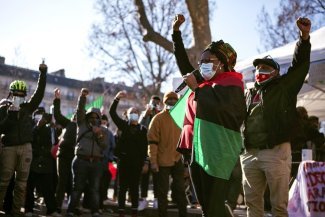
A lone protester stands opposite a massive image of Bruno Candé at a rally held in his honour on 31 July 2020 in Lisbon, Portugal. Candé was murdered on 25 July by a man who shouted racist insults before shooting the 39-year-old actor four times. One week later, hundreds of protesters gathered in the Portuguese capital to demand ‘Justiça para Bruno Candé’.
On a sunny Saturday in July, Bruno Candé sat, as he did every day, on a bench with his labrador, on a busy street in the Lisbon suburb of Moscavide. At around one in the afternoon Evaristo Marinho, 76, approached Candé with a gun, opened fire and shot him four times at close range, killing him in exactly the same spot where, just a few days earlier, he had told Candé to “go back” to where he came from.
Born in Lisbon to parents from Guinea-Bissau, 39-year-old Candé was where he came from. A father to three small children, he was passionate about acting and belonged to a Lisbon-based theatre company. He had recently shared plans to write a book. But none of that mattered to Marinho, a colonial war veteran and retired nursing assistant. Days before the shooting, several witnesses say he attacked Candé with racist slurs, telling him to “go back to the senzala [slave quarters]” and shouting degrading insults directed at his mother and other Black women.
It appears that the harassment may have been ongoing: “Weeks before he had complained to a friend that he was being insulted and threatened,” says Candé’s niece Andreia Araújo. “But he felt he couldn’t do anything about it because the man was old.” According to witnesses, Marinho threatened to kill Candé with “guns from the colonies” three days before the murder on 25 July, after they had an argument over the actor’s dog. “But it wasn’t just about the dog,” Araújo tells Equal Times. She is sure that her uncle was murdered because of the colour of his skin. “What happened to Bruno has happened to many before. And if we don’t do anything, it will continue to happen. We want justice,” she says firmly.
Candé’s murder has sparked a major debate on racism and the afterlife of colonialism in Portugal, but not everyone is convinced of the motives behind the murder of a Black man by a white man who had hurled racial slurs. Denial has been widespread.
A police spokesperson initially dismissed the possibility of racist motivations, saying that none of the witnesses mentioned racist insults. The police were forced to withdraw this statement after journalists and activists collected multiple testimonies indicating the exact opposite. One of Portugal’s most respected newspapers published a profile of the suspect, portraying him as a bad-tempered retiree who used to fight “with everyone”, someone who suffered from post-traumatic stress from the colonial wars Portugal fought against African independence movements over four decades ago.
Mamadou Ba, a prominent human rights activist and the head of SOS Racismo, one of Portugal’s leading anti-racism organisations, says that the media, predictably, attempted to discredit Candé in the wake of his murder, digging into his past to portray him as someone troublesome; a regurgitating of the ‘he was no angel’ trope, often wheeled out by the establishment media to rationalise racist murders. At the same time, Ba notes the way in which journalists underplayed the racist motivation of the crime, in part because of the enduring national myth that racism isn’t a problem in Portugal. “What happened [to Candé] is being attributed to a supposed [individual] trauma, to a pathological issue,” he says. “It is as if this person lived in isolation and was not part of a society that leads to this kind of behaviour,” he tells Equal Times. “But [Marinho’s] individual trauma is part of a collective trauma. And as long as we’re unable to deal with colonial trauma, we will be unable to deal with racial issues.”
The dark legacy of Portugal’s colonial past
As Portugal began, at the beginning of the 15th century, to seek new trade routes during what was known as the ‘Age of Discovery’, it became Europe’s preeminent colonial power, closely followed by its rivals, the Spanish, the Dutch, the French, the English and later the Germans who all conquered and exploited land and peoples across the globe. As outlined in the historian Francisco Bethencourt’s 2014 book Racisms, the Portuguese initiated the transatlantic slave trade and were responsible for the transportation of over 5.8 million enslaved people, almost half of the estimated 12.5 million Africans kidnapped and transported overseas to work in the Americas between the 15th and 19th centuries. Portugal was responsible for the enslavement of more people than any other colonial nation. Even after abolishing slavery in 1878, forced labour continued in Portugal’s colonies well into the 1960s, along with segregation and racial hierarchies.
From 1933, Portugal was governed by the authoritarian dictatorship of António de Oliveira Salazar and his Estado Novo (New State). Between 1961 and 1974, Salazar’s far-right regime fought against liberation movements in Angola, Mozambique and Guinea-Bissau in an attempt to hold on to its African colonies at a time when all other colonial powers were entering a period of decolonisation. Marinho was one of hundreds of thousands of Portuguese men conscripted to fight in the ‘Overseas War’. In prison, Marinho (who is in pre-trial detention where he has been charged, so far, with qualified homicide and possession of an illegal weapon) reportedly bragged that: “In Angola, I killed several like this [referring to Candé]”.
In April 1974, a group of low-ranking officers rebelled against Portugal’s dictatorship to bring an end to military action in Africa and establish a democratic system, triggering what became known as the ‘Carnation Revolution’. The struggle of African liberation movements and the military coup in Lisbon signalled the end of a colonial empire which spanned across five centuries and three continents. But for many, history and national narratives haven’t yet been decolonised.
“The glorification of the so-called ‘discoveries’ is still part of the myth at the heart of Portugal’s national identity,” says Beatriz Gomes Dias, a former biology teacher and current Member of Parliament for Bloco de Esquerda (Left Block), who in October 2019 became one of three women of African descent elected to Portugal’s parliament for the first time.
Portugal’s overseas explorations and the establishment of its colonial empire is still regarded as a source of national pride, and it is described in textbooks as a golden age of adventurous voyages, with little to no mention of the crimes perpetrated by the empire – from massacres, to slavery and forced labour, to the looting and appropriation of land and resources.
Gomes Dias says this is rarely talked about because of an unwillingness to confront the crimes of the past, often shielded by the myth that Portuguese colonialism was less harsh and more tolerant than other European powers (an idea encapsulated in Brazilian sociologist Gilberto Freyre’s concept of ‘Luso-tropicalism’). “There is this national fantasy [of Portuguese exceptionalism] which is maintained by silence and omission,” she says. “But we need to dismantle these fantasies that feed racism and justify exploitation and supremacist ideas.”
Structural inequality, deeply rooted in Empire
Gomes Dias argues that Bruno Candé’s murder highlights the deep links between Portugal’s colonial past and the structural racism which is part of its legacy. Although under Portuguese law it is illegal to collect data related to race and ethnicity, several studies have shown that people of African descent earn less, have higher unemployment rates and are half as likely to go to university. Incarceration rates are thought to be at least 10 times higher for Afro-descendants. Roma communities, which have been living in Portugal since the 15th century, also experience profound marginalisation. But the impossibility of collecting ethnic and racial data makes it difficult to prove how deep and widespread racial discrimination is, perpetuating the denial of its existence.
A study conducted among people of African descent by the European Union Agency for Fundamental Rights found that almost a quarter of respondents in Portugal had experienced racist harassment. The rates of racist victimisation, however, were even higher in other EU countries included in the survey. At the same time, it is worth noting that Portugal records one of Europe’s highest rates of racist beliefs (62 per cent), according to the latest European Social Survey.
When Marinho told Candé to “go back” to where he came from, he was rehashing a racist trope used to deny someone a sense of belonging.
“All racialised people have been told this before,” says Gomes Dias – including Joacine Katar Moreira, an independent Black MP, by the head of Portugal’s far-right party Chega (Enough). As Portugal elected its first three Black women MPs (Romualda Fernandes from Prime Minister António Costa’s Socialist Party, in addition to Katar Moreira and Gomes Dias), the far-right also won its first parliamentary seat since the end of Portugal’s dictatorship in 1974.
A former football commentator, Chega’s leader André Ventura is known for making derogatory remarks against ethnic minorities and for denying the existence of racism in Portugal: following a demonstration by activists demanding justice for Bruno Candé on 31 July, the far-right party decided to call a counter-demonstration to say the crime had nothing to do with racism. Hundreds of Chega supporters gathered in Lisbon holding signs saying: “Portugal is not racist.” It wasn’t the first time they marched against anti-racism movements. In June, the far-right held the same signs to counter an earlier protest held by supporters of the Black Lives Matter movement in the wake of the murder of George Floyd in the United States, which became the biggest anti-racism demonstration to have ever taken place in Portugal.
Ventura has threatened to organise counter-demonstrations to deny racism every time anti-racist groups take to the streets. This kind of furious denial goes all the way back to the colonial period, but its reassertion is mostly a reaction to the strong mobilisation of anti-racism activists in recent months.
There is also a link to the election of Fernandes, Katar Moreira and Gomes Dias, demonstrating that when voices against racism grow louder, so do the attempts to silence them.
Public rebuttals against anti-racism have taken an even more sinister turn in recent weeks. On 8 August, a few members of far-right and neo-Nazi movements surrounded the SOS Racismo building wearing white masks and carrying torches. Weeks before the parade, the words “war against the enemies of my nation” were sprayed on the organisation’s walls.
SOS Racismo has collected data on more than 700 racially motivated crimes since 2012, and it says the brutality and frequency of hate speech, threats and racist violence is increasing. Last week, the European Network Against Racism and several other civil society organisations denounced attacks on racialised minorities and anti-racist human rights defenders, while calling for an “urgent institutional response” from Portuguese and European authorities.
Anti-racism activists like Mamadou Ba and leftist MPs including Katar Moreira and Gomes Dias have received death threats, with emails telling them they have 48 hours to leave Portugal or they and their families will face the consequences. “They want to scare us, to keep us in a position of subalternity, to deny us agency,” says Gomes Dias. “But we won’t be intimidated by them,” she adds resolutely. “We’re determined to fight for equality, so that murders like Bruno Candé’s will never happen again.”









